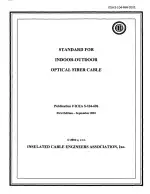ICEA S-104-696:2001 PDF Download
Standard EN SampleIndoor-Outdoor Optical Fiber Cable
Also Known As:
SKU915919684
Published by
Insulated Cable Engineers Association
ICEA
Publication Date2001
Pages CountPages54
This Standard covers optical fiber communications cables
intended for use in Indoor-Outdoor optical fiber applications.
Materials, constructions and performance requirements are included
in the Standard, together with applicable test procedures. Refer to
ICEA 5-83-596 for optical fiber communications cables intended for
indoor use, and to ICEA S-87-640 for optical fiber communication
cables intended for outdoor use.
When a composite cable (a cable with both optical fibers and metallic conductors) is required, the applicable metallic conductor requirements shall be as established by agreement between the end user and the cable manufacturer. The requirements of ANSI/ICEA S-84-608 should be considered when determining appropriate requirements.
All designs covered by the Standard are intended for operation under normal conditions found in the outside plant environment and in the communications user's premises. These products normally convey communications signals (voice, video, and data) from point to point or point to multi point, within and outside buildings. Products covered by this Standard may be factory terminated with connectors or splicing modules.
Indoor-Outdoor cables are generally used in short lengths, to make interconnections within and between adjacent buildings. These cables are fully resistant to the typical outside plant environment, but their attenuation characteristics are not necessarily the same as long-length Outside Plant Communications cables. See part 8 of this specification.
The standard installation tensile rating for cables covered by this Standard is 2670 N (600 Ib.) for cables with more than 12 fibers and 1335 N (300 Ib.) for cables with less than or equal to 12 fibers. The residual load is defined as a load equivalent to 30 percent of the rated installation load.
When a composite cable (a cable with both optical fibers and metallic conductors) is required, the applicable metallic conductor requirements shall be as established by agreement between the end user and the cable manufacturer. The requirements of ANSI/ICEA S-84-608 should be considered when determining appropriate requirements.
All designs covered by the Standard are intended for operation under normal conditions found in the outside plant environment and in the communications user's premises. These products normally convey communications signals (voice, video, and data) from point to point or point to multi point, within and outside buildings. Products covered by this Standard may be factory terminated with connectors or splicing modules.
Indoor-Outdoor cables are generally used in short lengths, to make interconnections within and between adjacent buildings. These cables are fully resistant to the typical outside plant environment, but their attenuation characteristics are not necessarily the same as long-length Outside Plant Communications cables. See part 8 of this specification.
The standard installation tensile rating for cables covered by this Standard is 2670 N (600 Ib.) for cables with more than 12 fibers and 1335 N (300 Ib.) for cables with less than or equal to 12 fibers. The residual load is defined as a load equivalent to 30 percent of the rated installation load.
Details
History and complementary documents
History
| Edition | 1.0 |
| Language(s) | English |
| File Size | 737.3 KB |
Purchase
Right after completing the purchase process, you will immediately get a digital copy of this standard which is:
Not Locked
Printable
Multi-User
$
35.00


